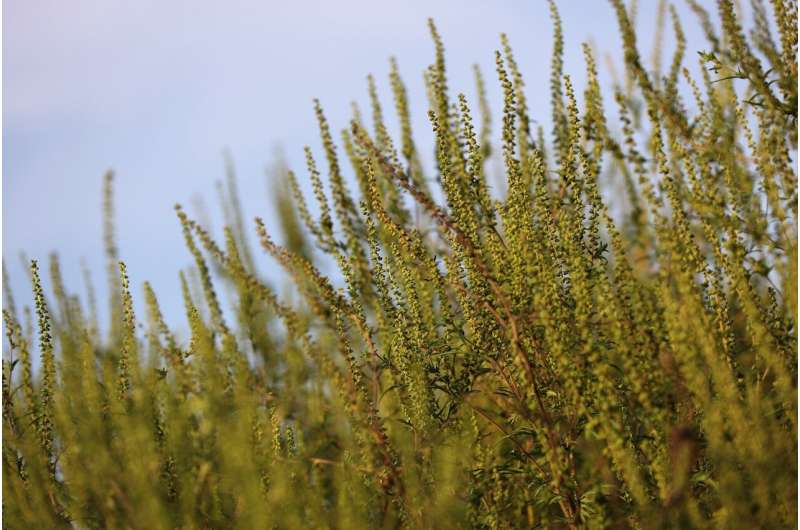Extended Pollen Seasons Worsen Allergies and Impact Pollinators Due to Climate Change

Longer pollen seasons driven by climate change are worsening allergies, increasing respiratory issues, and affecting pollinator behavior, highlighting the urgent need for environmental action.
As autumn settles in, many residents in Chicago and beyond are experiencing intensified allergy symptoms, partly driven by prolonged pollen seasons. Recent reports indicate that the pollen season now lasts longer than ever before, largely due to climate change. This extension is primarily caused by shorter winters and a warmer climate, which allow plants like ragweed, grasses, and trees to grow and pollinate for more extended periods.
In Chicago, high pollen counts from ragweed—often the chief culprit in seasonal allergies—have been recorded at levels comparable to the peak in 2018. Pollen counts have surged because warmer temperatures cause the growing season to lengthen, with the period between the last spring freeze and the first fall frost increasing by approximately 21 days since 1970. Furthermore, the number of high pollen days and peak pollen episodes has also risen, aggravating allergy symptoms.
The impact isn't limited to allergies; it extends to insect behavior and ecology. Bees and wasps are active earlier and later into the year, attracted by the longer flowering periods, which alters their natural life cycles. While bees are crucial pollinators, wasps such as yellow jackets, which are invasive species, are increasingly aggressive around outdoor dining and can sting unprovoked. The prolongation of their active seasons poses additional challenges for urban residents.
Research underscores that increased levels of carbon dioxide—a key driver of global warming—stimulate more pollen production in plants like grasses and ragweed. Dry, mild weather further amplifies this effect, and if greenhouse gas emissions remain unchecked, pollen production could double or triple by the end of this century, worsening allergy seasons significantly.
Furthermore, air pollution compounds these issues by damaging respiratory health. Pollutants like ground-level ozone and particulate matter exacerbate airway inflammation and make allergic reactions more severe. This dual threat from pollen and pollution is particularly concerning for vulnerable groups, including children, who are more likely to develop asthma and experience emergency health episodes triggered by pollen exposure.
In light of these changes, experts recommend proactive measures: keep windows closed during high pollen days, use air purifiers indoors, shower after outdoor activities, and consult allergy forecasts regularly. These strategies are essential for minimizing exposure and managing symptoms during increasingly lengthy and intense allergy seasons.
Overall, the interplay of climate change, rising pollen levels, and urban pollution is significantly affecting public health and ecological systems. Addressing these issues requires comprehensive efforts to reduce greenhouse gases and mitigate their effects. Understanding this link helps emphasize the importance of climate action in safeguarding our respiratory health and preserving vital pollinators.
Source: https://medicalxpress.com/news/2025-09-pollen-season-longer-worsening-allergies.html
Stay Updated with Mia's Feed
Get the latest health & wellness insights delivered straight to your inbox.
Related Articles
Exploring Microglia Transplantation as a Potential Therapy for Neurodegenerative Diseases
Scientists are exploring microglia transplantation as a promising strategy to slow neurodegeneration and treat disorders like Alzheimer's, offering hope for innovative therapies without harsh preconditioning treatments.
Innovative Liver Organoid Model Recreates Complex Liver Structure
Scientists have developed a new liver organoid model that accurately replicates the organ's complex cellular architecture, enabling detailed study of liver functions and diseases in the lab.
Innovative Strategy Targets Protein to Prevent Lung Tissue Changes in Asthma
A new study introduces a novel protein-targeting strategy that may prevent airway remodeling in asthma, offering hope for improved treatments to reduce tissue thickening and mucus overproduction.
Rising Youth Participation in Finnish Sports Clubs Amid Persistent Inequalities
A recent Finnish study shows rising youth participation in sports clubs, but socioeconomic and regional inequalities still limit access for many children. Addressing these disparities can promote healthier, more inclusive physical activity for all.



